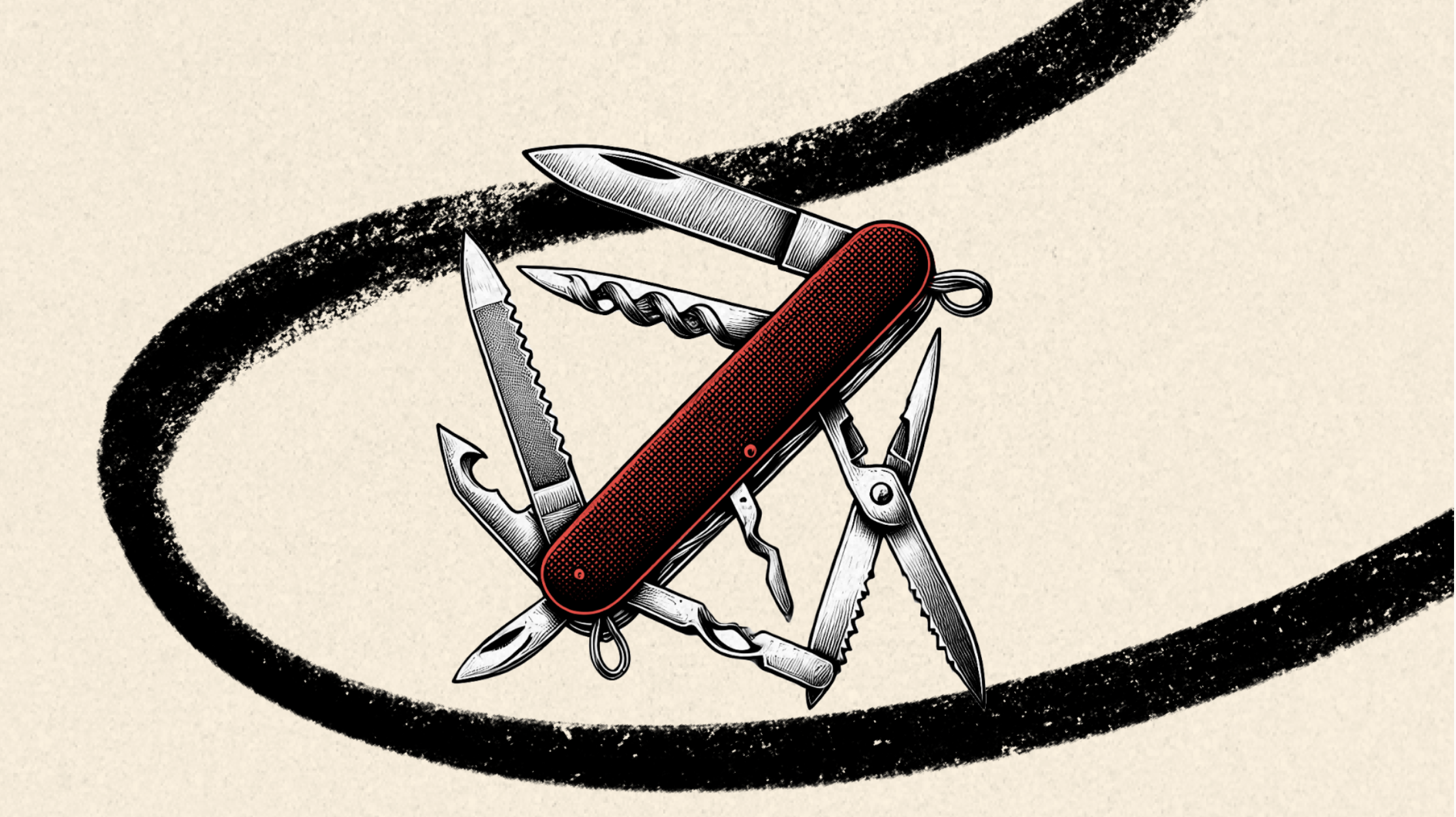
The pace of AI development is moving extremely fast—so fast that it's not uncommon for us to look back on what we wrote and see that the future we were describing is here. Dan Shipper's piece about the importance of generalists over specialists in the AI age from six months ago holds true more than ever. He reframes what it means to be a generalist—not just someone with shallow knowledge across multiple domains, but a curious, adaptable problem-solver who thrives in environments where rules are unclear and patterns aren't obvious. In an allocation economy, the winners won't be those who know all the answers, but those who know which questions to ask in the first place.—Kate Lee
Was this newsletter forwarded to you? Sign up to get it in your inbox.
A common refrain I hear is that in the age of AI, you don’t want to be a “jack of all trades and a master of none.”
For example, my good friend (and former Every writer) Nat Eliason recently argued:
“Trying to be a generalist is the worst professional mistake you can make right now. Everyone in the world is getting access to basic competence in every white-collar skill. Your ‘skill stack’ will cost $30/month for anyone to use in 3-5 years.”
He makes a reasonable point. If we think of a generalist as someone with broad, basic competence in a wide variety of domains, then in the age of AI, being a generalist is a risky career move. A language model is going to beat your shallow expertise any day of the week.
But I think knowing a little bit about a lot is only a small part of what it means to be a generalist. And that if you look at who generalists are—and at the kind of mindset that drives a person who knows a lot about a little—you’ll come to a very different conclusion: In the age of AI, generalists own the future.
Sponsored by: LTX Studio
Take your idea to the next level
Good ideas are all you need. Everything else can be done with the help of AI. Use LTX Studio to storyboard, develop, and bring your vision to life in seconds. Then, dive into their suite of ever-growing customization features to refine your creative vision:
- Convey realistic emotions in every shot—even down to facial expressions.
- Match any voice and dialogue you want to any character.
- Control a scene’s location, lighting, and even weather.
Tell authentic, inspiring, and interesting stories, without cutting corners.
What generalists are
Generalists are usually curious people who like to hop around from domain to domain. They enjoy figuring things out, especially in areas that are uncertain or new. They’re good at solving problems that domain experts struggle with, because they’re able to bring bits of knowledge from diverse fields together.
As Nat notes, because of their propensity to hop domains, generalists tend to possess a wide set of shallow skills. But measuring them against their rudimentary coding abilities or their working knowledge of French baking technique misses their true advantage: the ability to adapt to new situations, and the desire to do so.
Where generalists thrive
In Range: How Generalists Triumph in a Specialized World, David Epstein argues that generalists are especially good in what he calls “wicked” environments: “In wicked domains, the rules of the game are often unclear or incomplete, there may or may not be repetitive patterns and they may not be obvious, and feedback is often delayed, inaccurate, or both.”
According to Epstein, this is where generalists thrive. They are able to use their diverse experiences to attack problems in unique ways and see solutions that no one else can see.
He contrasts wicked environments with what he calls “kind” environments, where feedback is immediate and there are clear, repetitive patterns that lead to success. These are the domains where the experts tend to shine. They can apply their specific expertise to solving problems over and over again, because they’ve seen those problems in some form before.
Kind environments, interestingly enough, are also where LLMs thrive. A few weeks ago, I likened large language models like GPT-4o and Claude Sonnet 3.5 to having “10,000 Ph.D.’s available at your fingertips.” They are quite proficient at most areas of specialist knowledge in the world. But they are still not very good at figuring out entirely novel problems.
This view of LLMs suggests the reverse of Nat’s thesis: trouble for experts and opportunities for generalists. LLMs are weak in wicked domains and strong in kind ones where experts thrive. If you’re an expert navigating a novel problem, an LLM won’t imagine a new solution for you. But they become a gift for generalists, who can use them to get up to speed in new domains much more quickly, and resurface and apply knowledge from other fields easily. Generalists can use their adaptability and imagination to work through any “wickedness” that a language model can’t handle on its own.
In an allocation economy, where you’re compensated not based on what you know, but on your ability to deploy intelligence, language models aren’t a threat to generalists—they are a potent weapon.
The past and future of generalists
Generalists have been out of style since at least the time of Adam Smith, who popularized the notion of specialization and division of labor as a driver of economic growth in the 18th century. In fact, we probably have to go back to ancient Greece to find an example of a society where generalists were the norm instead of the exception.
Ancient Athens was a direct democracy. Citizens, as a rule, participated in all aspects of civic life, from politics to warfare. Any citizen could be judge, jury member, senator, and soldier. In The Greeks, the classicist H.D.F. Kitto writes that Athenian society was driven by the ideal that in Athens, “a man owed it to himself, as well as to the [city], to be everything in turn.” This ethos, Kitto argues, implied “a respect for the wholeness or the oneness of life, and a consequent dislike of specialization.” In short, Athens was a society of well-rounded individuals—or generalists. (Of course, it must be noted that citizenship was limited to adult males. Athens was not a utopia.)
But as time passed, and life in Athens became more economically, socially, politically, and militarily advanced, this society of generalists began to fissure. Progress equals complexity, and complexity requires specialization. As Kitto explains it, “If one man in his time is to play all the parts, these parts must not be too difficult for the ordinary man to learn. And this is where the polis broke down.“
As AI becomes more capable of specialized tasks, we might see a return to the Greek ideal of the well-rounded citizen. This time, though, we can do it in the context of an advanced and complex economy because a citizen armed with AI will be far more capable of playing many roles than one without.
Being a generalist gives us something that language models don’t have: the capacity to learn quickly, and to see and solve novel problems in new domains.
In an allocation economy, the person who wins isn’t the expert who knows the exact answer to a question.
It’s the one who knows which questions to ask in the first place.
Dan Shipper is the cofounder and CEO of Every, where he writes the Chain of Thought column and hosts the podcast AI & I. You can follow him on X at @danshipper and on LinkedIn, and Every on X at @every and on LinkedIn.
We also build AI tools for readers like you. Automate repeat writing with Spiral. Organize files automatically with Sparkle. Write something great with Lex. Deliver yourself from email with Cora.
We also do AI training, adoption, and innovation for companies. Work with us to bring AI into your organization.
Get paid for sharing Every with your friends. Join our referral program.
The Only Subscription
You Need to
Stay at the
Edge of AI
The essential toolkit for those shaping the future
"This might be the best value you
can get from an AI subscription."
- Jay S.
Join 100,000+ leaders, builders, and innovators

Email address
Already have an account? Sign in
What is included in a subscription?
Daily insights from AI pioneers + early access to powerful AI tools










Comments
Don't have an account? Sign up!
I always think generalists should know enough about a topic to be dangerous. As you say their real superpower is knowing a bit about a lot of topics, and combining them in new ways to make things better. When they partner with AI, it only amplifies their dangerousness.
As an aside, my own personal measure of AGI is when the machines can match this:
"A human being should be able to change a diaper, plan an invasion, butcher a hog, conn a ship, design a building, write a sonnet, balance accounts, build a wall, set a bone, comfort the dying, take orders, give orders, cooperate, act alone, solve equations, analyze a new problem, pitch manure, program a computer, cook a tasty meal, fight efficiently, die gallantly. Specialization is for insects."
— *Robert A. Heinlein, Time Enough for Love (1973)
Christian -- Thanks for quoting Heinlein, one of my favorite authors and life-advisors! Lazarus Long (aka Woodrow Wilson Smith) was indeed a generalist.
§ Lorin
I feel seen and understood. Thanks for sharing such an eloquent perspective.
Hmm, I'm not convinced. "They’re good at solving problems that domain experts struggle with...". Really? Which problems? There's no argument to be made here. Simply look at the job market and the requirements for getting hired. No serious company is hiring generalists. Now, if by "generalist" you mean "solopreneur", then I can see how they will thrive, but that worker profile accounts for a very small fraction of the population.